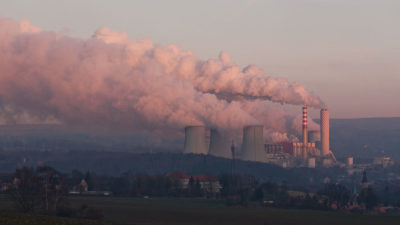The coal-burning Turów Power Station in Bogatynia, Poland. Vondraussen/Wikimedia Commons
The European Investment Bank (EIB), the world’s largest development lender, announced it will no longer finance fossil fuel projects, starting in 2021, several news outlets reported. The bank said it will instead unlock $1.1 trillion for climate action investments, including renewable energy and resiliency projects, over the next decade.
“We will stop financing fossil fuels and we will launch the most ambitious climate investment strategy of any public financial institution anywhere,” EIB President Werner Hoyer said in a statement. Hoyer called the bank’s decision “a quantum leap in its ambition.”
The European financial institution, owned by EU member states, approved nearly $62 billion in loans in 2018, 86 percent of which went to projects in European countries. The bank phased out lending to coal projects in 2013, according to Climate Homes News, but continued to support oil and natural gas development. Between 2014 and 2018, EIB loaned out $2.5 billion for oil and natural gas production in the EU, as well as $8.6 billion for fossil fuel transmission and distribution, The Wall Street Journal reported.
The new policy makes the EIB the first multilateral bank to ban all fossil fuel investments. Last week, EU finance ministers called on other banks, including the World Bank and the Asian Development Bank, to follow suit.
“In order to achieve the Paris climate targets, any new investments must only be spent on sustainable and renewable energy and no longer on fossil fuels,” Claudia Kemfert, an economist at the German Institute for Economic Research, told The Wall Street Journal. “The decision of the European Investment Bank is therefore a game changer. It will have a lasting effect on the financial markets.”



